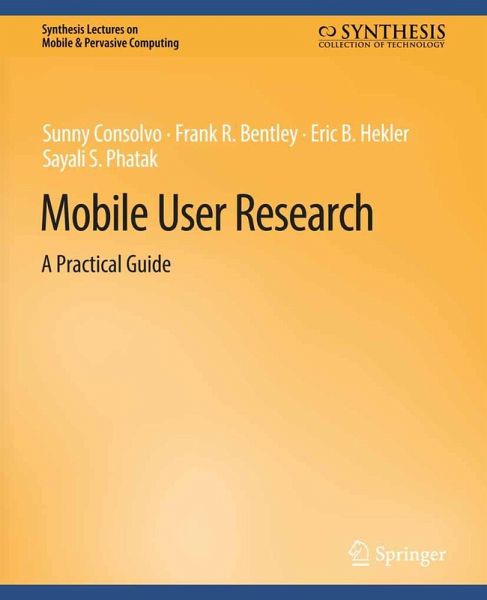
Mobile User Research (eBook, PDF)
A Practical Guide
Versandkostenfrei!
Sofort per Download lieferbar
Statt: 53,49 €**
40,95 €
inkl. MwSt.
**Preis der gedruckten Ausgabe (Broschiertes Buch)
Alle Infos zum eBook verschenkenWeitere Ausgaben:

PAYBACK Punkte
20 °P sammeln!
This book will give you a practical overview of several methods and approaches for designing mobile technologies and conducting mobile user research, including how to understand behavior and evaluate how such technologies are being (or may be) used out in the world. Each chapter includes case studies from our own work and highlights advantages, limitations, and very practical steps that should be taken to increase the validity of the studies you conduct and the data you collect.This book is intended as a practical guide for conducting mobile research focused on the user and their experience. W...
This book will give you a practical overview of several methods and approaches for designing mobile technologies and conducting mobile user research, including how to understand behavior and evaluate how such technologies are being (or may be) used out in the world. Each chapter includes case studies from our own work and highlights advantages, limitations, and very practical steps that should be taken to increase the validity of the studies you conduct and the data you collect.
This book is intended as a practical guide for conducting mobile research focused on the user and their experience. We hope that the depth and breadth of case studies presented, as well as specific best practices, will help you to design the best technologies possible and choose appropriate methods to gather ethical, reliable, and generalizable data to explore the use of mobile technologies out in the world.
This book is intended as a practical guide for conducting mobile research focused on the user and their experience. We hope that the depth and breadth of case studies presented, as well as specific best practices, will help you to design the best technologies possible and choose appropriate methods to gather ethical, reliable, and generalizable data to explore the use of mobile technologies out in the world.
Dieser Download kann aus rechtlichen Gründen nur mit Rechnungsadresse in A, B, BG, CY, CZ, D, DK, EW, E, FIN, F, GR, HR, H, IRL, I, LT, L, LR, M, NL, PL, P, R, S, SLO, SK ausgeliefert werden.












